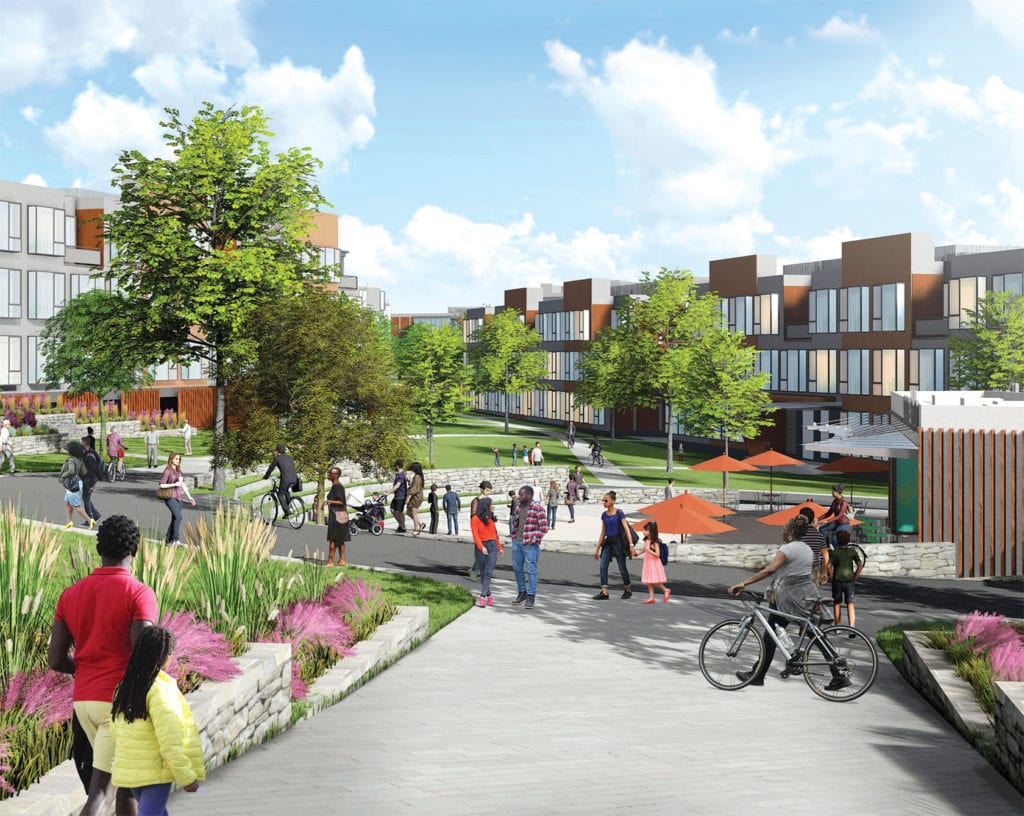
The Boston State Hospital Citizens Advisory Committee’s backing of a planned 367-unit development has raised concerns among Mattapan residents, some of whom say they were left out of a key decision-making process that could have profound implications on the future of the neighborhood.
The CAC, as the group is known, selected a team comprising Accordia Partners, headed by local real estate developer Kirk Sykes, and Toll Brothers Apartment Living, a Pennsylvania-based developer of luxury complexes.
The CAC’s role in the process is strictly advisory. The state Division of Capital Asset Management and Maintenance (DCAMM) has the sole authority to select a developer. But the CAC was established by the state legislature in 1985 to ensure members of the Mattapan community had a voice in the redevelopment of the former Boston State Hospital campus, which at that time was the largest tract of vacant land in Boston.
While developers are required to present before the CAC as part of the land disposition process, they’re not required to meet with other local neighborhood associations.
Neighborhood groups can attend CAC meetings. But Fatima Ali-Salaam, chair of the Greater Mattapan Neighborhood Council, said the CAC made its decision in a meeting that was held with scant prior notice, effectively excluding local neighborhood associations.
A notification for the April 29 meeting, which was held virtually, was posted on the Boston.gov website April 24. Ali-Salaam and other neighborhood residents said they did not receive customary email notifications of the meeting.
Because community groups were not privy to the questions asked of developers during the April 29 meeting, Ali-Salaam says Mattapan residents don’t know what commitments developers made to hiring people of color in the construction process.
“We’re concerned about a project coming in that would not hire people of color in a substantial way for the construction and management of the property,” she said.
CAC member Royal Bolling Jr. told the Banner that the eight-member CAC vetted developers for their plans to include blacks and Latinos in the hiring and management of the project.
“If anyone’s disgruntled, it’s part of the process of how decisions are made,” he said.
But David Lopes, who has several decades of experience in the construction industry, said CAC members would benefit from a more inclusive process in which a greater variety of community voices could be heard.
“None of the people on the CAC know anything about development,” he said.
Lopes said community groups routinely ask developers for commitments on the percentage of people of color involved in a project and factor those percentages into their decision-making processes.
“Who’s going to work on the project?” he said. “Who’s going to build wealth? Who’s going to manage the property after? If you’re coming in here to build 367 units, whatever contractor you’re bringing in matters.”
The Accordia/Toll Brothers proposal lists Sykes’ firm, Primary Corporation, as a partner with a 51% interest in the development project. The proposal also states that Toll Brothers Apartment Living will “finance, develop, own and manage the property.”
When contacted by the Banner two weeks ago, Sykes declined to be interviewed on the project, citing the ongoing DCAMM process of selecting a developer for the site.
The Accordia/Toll Brothers proposal outlines efforts the development team will undertake to ensure people of color are hired for construction jobs but lists no percentages.
When asked whether minority ownership was a concern for the CAC, Bolling said, “I don’t think it’s a deal-breaker.”
“People’s focus is on the product,” he continued. “I think people have evolved in this whole development process. The focus is on the quality.”
Of the four portions of the Boston State Hospital site that have been developed, only one — Harvard Commons — was developed by a firm owned by people of color. Cruz Companies, the firm that built Harvard Commons, also bid on the parcel currently up for development.
Two others of the six bidders on the 10-acre parcel included significant ownership by people of color: Thomas Welch & Associates and CERO/Sheldon Lloyd, a team that includes a worker cooperative specializing in recycling food waste and Lloyd, who runs a commercial catering operation.


![Banner [Virtual] Art Gallery](https://baystatebanner.com/wp-content/uploads/2024/04/Cagen-Luse_Men-at-store-e1713991226112-150x150.jpg)



